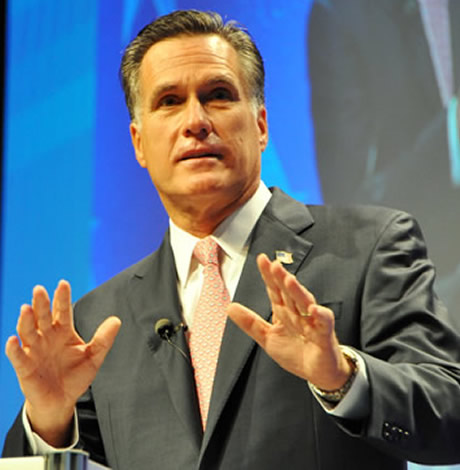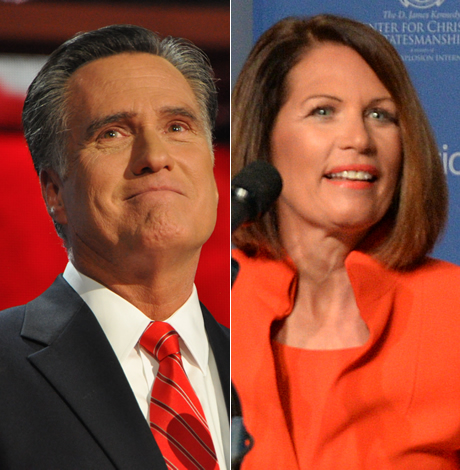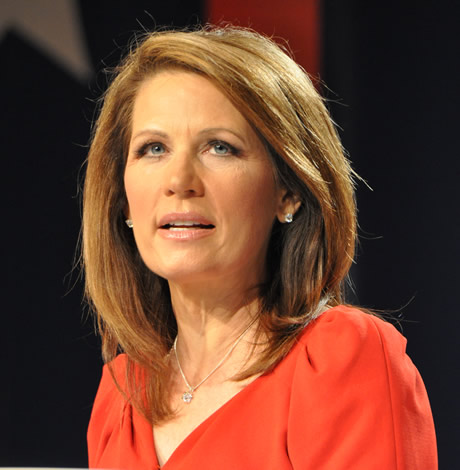National
Bachmann’s record is no laughing matter
Tea Party fave opposes LGBT rights; husband backs ‘ex-gay’ therapy
The anti-gay rhetoric and voting record of Rep. Michele Bachmann (R-Minn.) came under scrutiny this week in the wake of her announcement that she would run for the White House in 2012.
In a speech last week in her hometown of Waterloo, Iowa, the Tea Party favorite pledged to continue advancing conservative causes as she formally declared her candidacy.
“I want to bring a voice, your voice, to the White House, just as I have brought your voice to the halls of Congress to secure the promise of the future for our generation and generations to come,” Bachmann said.
But based on her voting record in Congress since she started representing Minnesota in the U.S. House in 2007, a Bachmann presidency would likely be bad news for LGBT Americans.
In addition to voting against “Don’t Ask, Don’t Tell” repeal and opposing the Employment Non-Discrimination Act, she also opposed hate crimes legislation.
Additionally, Bachmann has called for passage of a federal constitutional amendment that would ban same-sex marriage throughout the country, even though she was elected to Congress too late to vote on such a measure when it came before lawmakers.
As a state senator in Minnesota, Bachmann sponsored legislation to make a ban on same-sex marriage part of the state constitution. The amendment that Minnesota voters will vote on in 2012 is similar to the measure she proposed at that time.
Michael Cole-Schwartz, spokesperson for the Human Rights Campaign, predicted that a Bachmann presidency would mark a major setback for LGBT rights.
“A President Bachmann would mean a wholesale reversal from the gains we’ve seen over the past few years,” Cole-Schwartz said. “Not only would we see policy positions that hurt our families, the level of anti-LGBT rhetoric would no doubt rise as would the use of our community as a political wedge issue.”
The Bachmann campaign didn’t respond to the Washington Blade’s request for comment.
Bachmann could become a major player in the 2012 presidential campaign if she performs well in the early primary states and some experts have speculated that she would make a strong vice presidential pick. A favorite among the Tea Party wing of the GOP, Bachmann is already polling well in her home state of Iowa, where social conservatives tend to fare well in the GOP caucus.
According to a poll published June 26, Bachmann is nearly tied in Iowa with frontrunner, former Massachusetts Gov. Mitt Romney. The Des Moines Register Iowa Poll found that Romney was favored by 23 percent of likely Republican caucus-goers while Bachmann was supported by 22 percent.
Additionally, a poll published Wednesday by Public Policy Polling found Bachmann would place a strong second in the New Hampshire primary, even though the GOP in the state has more libertarian leanings. Romney leads in the state with the support of 25 percent of respondents, but Bachmann comes in second at 18 percent. She jumped 14 points in the last three months.
Bachmann has said recently that marriage should be left to the states to decide. However, she has always reiterated her support for the Federal Marriage Amendment — a contradiction because ratification of that measure would define marriage at the federal level.
During her appearance June 13 in the Republican presidential debate, Bachmann called for enactment of a Federal Marriage Amendment as she said she wouldn’t interfere with New Hampshire’s law allowing same-sex marriage.
“I do support a constitutional amendment on marriage between a man and a woman, but I would not be going into the states to overturn their state law,” Bachmann said.
Also during the debate, Bachmann said she would have kept “Don’t Ask, Don’t Tell” in place.
“I would want to confer with our commanders-in-chief and also with the Joint Chiefs of Staff because I want to know how it was being implemented and if it had the detrimental effects that have been suggested will come,” Bachmann said.
Chairman of the Joint Chiefs of Staff Adm. Mike Mullen came out in favor of “Don’t Ask, Don’t Tell” repeal in February. Some of the military service chiefs — most notably Marine Corps Commandant Gen. James Amos — opposed repeal of the military’s gay ban before Congress acted to lift the law, but each has said they can implement open service.
R. Clarke Cooper, executive director of Log Cabin Republicans, acknowledged his organization and Bachmann don’t “see eye-to-eye” on LGBT issues, but said her more nuanced rhetoric on marriage was noteworthy.
“We’ve been arguing all along that DOMA is incursion on states rights,” Cooper said. “It’s interesting to see her kind of move in that direction because that’s a nuance. It doesn’t mean that she’s all of a sudden a champion of fundamental rights by any means, but it’s interesting that she’s being forced to shift.”
In addition to her anti-gay stances on marriage and the military, Bachmann has also engaged in anti-gay political rhetoric throughout her career.
The slightly more nuanced — if contradictory — position that Bachmman has adopted on marriage is different from what she previously stated. According to the Washington Post, Bachmann has called marriage “probably the biggest issue that will impact our state and our nation in the last, at least, 30 years.”
Additionally, in the fight to push for a same-sex marriage ban in Minnesota in 2004, Bachmann said a member of her family is gay and called it “a very sad life. It’s part of Satan.” According to the Post, her stepsister, Helen LaFave, is gay and in 2006 publicly opposed the ban.
Scott Dibble, a gay Democratic state senator in Minnesota, said in a Post interview that Bachmann argued that advancing gay rights could result in children being “lured into trying homosexuality out” and that “the reason for high divorce rates in Scandinavian countries was that they offered equality” to LGBT people.
But Bachmann could be overshadowed in her anti-gay views by her husband, Marcus Bachmann, a therapist who runs a faith-based counseling center. His practice reportedly offers discredited conversion therapy for LGBT people, although he’s said that he doesn’t try to convert gay people who say “they want to stay homosexual.”
In an interview last year with a Christian radio show, Marcus Bachmann compared gays to “barbarians” and said they “need to be educated, need to be disciplined.”
“Just because someone feels it or thinks it doesn’t mean that we are supposed to go down that road,” he said. “That’s what is called the sinful nature. We have a responsibility as parents and as authority figures not to encourage such thoughts and feelings from moving into the action steps.”
Marcus Bachmann is close to his wife’s political campaign. According to the Washington Post, Bachmann recently called himself his wife’s “strategist” and has acted as her media planner, travel assistant and personal shopper.
Despite Bachmann’s anti-gay record, Log Cabin’s Cooper said the country has grown more supportive of LGBT rights since the last presidential election and the GOP has noticed.
“Looking at where are we are in 2011 heading off the 2012 cycle, it’s a much different world than it was in the ’08 cycle, and a far different world than it was in ’04 and 2000,” Cooper said. “We’re in a much different state as a country than we have ever been, and it is going to force campaigns to evaluate these issues.”
Federal Government
Lambda Legal praises Biden-Harris administration’s finalized Title IX regulations
New rules to take effect Aug. 1

The Biden-Harris administration’s revised Title IX policy “protects LGBTQ+ students from discrimination and other abuse,” Lambda Legal said in a statement praising the U.S. Department of Education’s issuance of the final rule on Friday.
Slated to take effect on Aug. 1, the new regulations constitute an expansion of the 1972 Title IX civil rights law, which prohibits sex-based discrimination in education programs that receive federal funding.
Pursuant to the U.S. Supreme Court’s ruling in the landmark 2020 Bostock v. Clayton County case, the department’s revised policy clarifies that discrimination on the basis of sexual orientation and gender identity constitutes sex-based discrimination as defined under the law.
“These regulations make it crystal clear that everyone can access schools that are safe, welcoming and that respect their rights,” Education Secretary Miguel Cardona said during a call with reporters on Thursday.
While the new rule does not provide guidance on whether schools must allow transgender students to play on sports teams corresponding with their gender identity to comply with Title IX, the question is addressed in a separate rule proposed by the agency in April.
The administration’s new policy also reverses some Trump-era Title IX rules governing how schools must respond to reports of sexual harassment and sexual assault, which were widely seen as imbalanced in favor of the accused.
Jennifer Klein, the director of the White House Gender Policy Council, said during Thursday’s call that the department sought to strike a balance with respect to these issues, “reaffirming our longstanding commitment to fundamental fairness.”
“We applaud the Biden administration’s action to rescind the legally unsound, cruel, and dangerous sexual harassment and assault rule of the previous administration,” Lambda Legal Nonbinary and Transgender Rights Project Director Sasha Buchert said in the group’s statement on Friday.
“Today’s rule instead appropriately underscores that Title IX’s civil rights protections clearly cover LGBTQ+ students, as well as survivors and pregnant and parenting students across race and gender identity,” she said. “Schools must be places where students can learn and thrive free of harassment, discrimination, and other abuse.”
Michigan
Mich. Democrats spar over LGBTQ-inclusive hate crimes law
Lawmakers disagree on just what kind of statute to pass

Michigan could soon become the latest state to pass an LGBTQ-inclusive hate crime law, but the state’s Democratic lawmakers disagree on just what kind of law they should pass.
Currently, Michigan’s Ethnic Intimidation Act only offers limited protections to victims of crime motivated by their “race, color, religion, gender, or national origin.” Bills proposed by Democratic lawmakers expand the list to include “actual or perceived race, color, religion, gender, sexual orientation, gender identity or expression, ethnicity, physical or mental disability, age, national origin, or association or affiliation with any such individuals.”
Democratic Gov. Gretchen Whitmer and Attorney General Dana Nessel have both advocated for a hate crime law, but house and senate Democrats have each passed different hate crimes packages, and Nessel has blasted both as being too weak.
Under the house proposal that passed last year (House Bill 4474), a first offense would be punishable with a $2,000 fine, up to two years in prison, or both. Penalties double for a second offense, and if a gun or other dangerous weapons is involved, the maximum penalty is six years in prison and a fine of $7,500.
But that proposal stalled when it reached the senate, after far-right news outlets and Fox News reported misinformation that the bill only protected LGBTQ people and would make misgendering a trans person a crime. State Rep. Noah Arbit, the bill’s sponsor, was also made the subject of a recall effort, which ultimately failed.
Arbit submitted a new version of the bill (House Bill 5288) that added sections clarifying that misgendering a person, “intentionally or unintentionally” is not a hate crime, although the latest version (House Bill 5400) of the bill omits this language.
That bill has since stalled in a house committee, in part because the Democrats lost their house majority last November, when two Democratic representatives resigned after being elected mayors. The Democrats regained their house majority last night by winning two special elections.
Meanwhile, the senate passed a different package of hate crime bills sponsored by state Sen. Sylvia Santana (Senate Bill 600) in March that includes much lighter sentences, as well as a clause ensuring that misgendering a person is not a hate crime.
Under the senate bill, if the first offense is only a threat, it would be a misdemeanor punishable by one year in prison and up to $1,000 fine. A subsequent offense or first violent hate crime, including stalking, would be a felony that attracts double the punishment.
Multiple calls and emails from the Washington Blade to both Arbit and Santana requesting comment on the bills for this story went unanswered.
The attorney general’s office sent a statement to the Blade supporting stronger hate crime legislation.
“As a career prosecutor, [Nessel] has seen firsthand how the state’s weak Ethnic Intimidation Act (not updated since the late 1980’s) does not allow for meaningful law enforcement and court intervention before threats become violent and deadly, nor does it consider significant bases for bias. It is our hope that the legislature will pass robust, much-needed updates to this statute,” the statement says.
But Nessel, who has herself been the victim of racially motivated threats, has also blasted all of the bills presented by Democrats as not going far enough.
“Two years is nothing … Why not just give them a parking ticket?” Nessel told Bridge Michigan.
Nessel blames a bizarre alliance far-right and far-left forces that have doomed tougher laws.
“You have this confluence of forces on the far right … this insistence that the First Amendment protects this language, or that the Second Amendment protects the ability to possess firearms under almost any and all circumstances,” Nessel said. “But then you also have the far left that argues basically no one should go to jail or prison for any offense ever.”
The legislature did manage to pass an “institutional desecration” law last year that penalizes hate-motivated vandalism to churches, schools, museums, and community centers, and is LGBTQ-inclusive.
According to data from the U.S. Department of Justice, reported hate crime incidents have been skyrocketing, with attacks motivated by sexual orientation surging by 70 percent from 2020 to 2022, the last year for which data is available.
Twenty-two states, D.C., Puerto Rico, and the U.S. Virgin Islands have passed LGBTQ-inclusive hate crime laws. Another 11 states have hate crime laws that include protections for “sexual orientation” but not “gender identity.”
Michigan Democrats have advanced several key LGBTQ rights priorities since they took unified control of the legislature in 2023. A long-stalled comprehensive anti-discrimination law was passed last year, as did a conversion therapy ban. Last month the legislature updated family law to make surrogacy easier for all couples, including same-sex couples.
A bill to ban the “gay panic” defense has passed the state house and was due for a Senate committee hearing on Wednesday.
Indiana
Drag queen announces run for mayor of Ind. city
Branden Blaettne seeking Fort Wayne’s top office

In a Facebook post Tuesday, a local drag personality announced he was running for the office of mayor once held by the late Fort Wayne Mayor Tom Henry, who died last month just a few months into his fifth term.
Henry was recently diagnosed with late-stage stomach cancer and experienced an emergency that landed him in hospice care. He died shortly after.
WPTA, a local television station, reported that Fort Wayne resident Branden Blaettne, whose drag name is Della Licious, confirmed he filed paperwork to be one of the candidates seeking to finish out the fifth term of the late mayor.
Blaettner, who is a community organizer, told WPTA he doesn’t want to “get Fort Wayne back on track,” but rather keep the momentum started by Henry going while giving a platform to the disenfranchised groups in the community. Blaettner said he doesn’t think his local fame as a drag queen will hold him back.
“It’s easy to have a platform when you wear platform heels,” Blaettner told WPTA. “The status quo has left a lot of people out in the cold — both figuratively and literally,” Blaettner added.

The Indiana Capital Chronicle reported that state Rep. Phil GiaQuinta, who has led the Indiana House Democratic caucus since 2018, has added his name to a growing list of Fort Wayne politicos who want to be the city’s next mayor. A caucus of precinct committee persons will choose the new mayor.
According to the Fort Wayne Journal Gazette, the deadline for residents to file candidacy was 10:30 a.m. on Wednesday. A town hall with the candidates is scheduled for 6 p.m. on Thursday at Franklin School Park. The caucus is set for 10:30 a.m. on April 20 at the Lincoln Financial Event Center at Parkview Field.
At least six candidates so far have announced they will run in the caucus. They include Branden Blaettne, GiaQuinta, City Councilwoman Michelle Chambers, City Councilwoman Sharon Tucker, former city- and county-council candidate Palermo Galindo, and 2023 Democratic primary mayoral candidate Jorge Fernandez.
-

 District of Columbia2 days ago
District of Columbia2 days agoReenactment of first gay rights picket at White House draws interest of tourists
-

 District of Columbia2 days ago
District of Columbia2 days agoNew D.C. LGBTQ+ bar Crush set to open April 19
-

 Arizona2 days ago
Arizona2 days agoAriz. governor vetoes anti-transgender, Ten Commandments bill
-

 Africa4 days ago
Africa4 days agoUgandan activists appeal ruling that upheld Anti-Homosexuality Act









